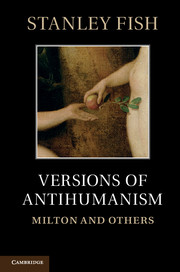Book contents
- Frontmatter
- Contents
- Acknowledgments
- Introduction: intention, historicism and interpretation
- Part I Milton
- Part II Early modern literature
- Chapter 8 “Void of storie”
- Chapter 9 Authors–readers
- Chapter 10 Marvell and the art of disappearance
- Chapter 11 Masculine persuasive force: Donne and verbal power
- Chapter 12 How Hobbes works
- Index
- References
Chapter 12 - How Hobbes works
Published online by Cambridge University Press: 05 May 2012
- Frontmatter
- Contents
- Acknowledgments
- Introduction: intention, historicism and interpretation
- Part I Milton
- Part II Early modern literature
- Chapter 8 “Void of storie”
- Chapter 9 Authors–readers
- Chapter 10 Marvell and the art of disappearance
- Chapter 11 Masculine persuasive force: Donne and verbal power
- Chapter 12 How Hobbes works
- Index
- References
Summary
In Milton and the Culture of Violence (1994) and in many other important writings, Michael Lieb has been concerned to show us what he sometimes calls the “darker, more unsettling side of Milton's personality” and Milton's God. While poems like Lycidas and “At a Solemn Music” end in visions of a universal harmony of undifferentiated voices free of discord and jarring notes, Milton, Lieb tells us, was throughout his life haunted by the fear of the “barbarous dissonance” that attended the dismemberment of Orpheus. The poet, in Lieb's account of him, was “desperate to avoid” the “return to the world of Chaos” – that “universal hubbub wild / Of stunning sounds and voices all confus'd” (PLii, 951–952) – that Orpheus's death at the hands of a “wild Rout” (PLvii, 34) symbolized for him. Milton's response to the specter of violent chaos is to assert against it a faith in a power even more dreadful. Lieb quotes the place in De doctrina Christiana where Milton urges the practice of timor dei, “reverencing God as the supreme Father and Judge of all men, and fearing above all to offend him.” Assaulted by forces that threaten to overwhelm him, the Miltonic “I,” says Lieb, always “seeks refuge in a power beyond itself.” That power, however, resides elsewhere – Lieb cites Samson Agonistes: “our living Dread who dwells / In Silo his great sanctuary” (1673–1674) – and one must affirm it in the face of visibilia that do not unambiguously declare it.
- Type
- Chapter
- Information
- Versions of AntihumanismMilton and Others, pp. 258 - 278Publisher: Cambridge University PressPrint publication year: 2012



